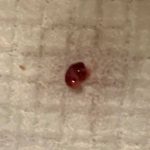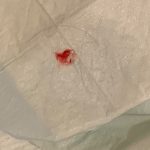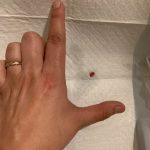Hello. My 16 year old female burmese “crashed” Feb 29, and March 2nd was diagnosed with Feline Lower Urinary Disease and Chronic Kidney Disease.
Her Kidney values are now stable and her only elevated numbers are Creatanine at 2.6 and Bun at 46
but her bladder keeps flaring up
When diagnosed she was shooting projectile urine. Her bladder wall was thickened. Covenia did nothing but Amoxycillin resolved the infection.
2 months later she had a couple of accidents and it appeared that she had another infection. Once again Amoxycillin worked! She had a culture done and it showed no bacteria..
She has been taking supplements Kidney Gold, and Moxxor Fish Oil since April, and started CBD oil around June
Late July I started her on D-Mannose and COrn Silk Extract as suggested in the FLUTD facebook group
last month she started peeing blood clots, Vet instructed me to give her Sub Q 100ml to flush her and start amoxycilin immediately.. 7 day course and she was fine, but 2 days after the course finished was a repeat episode.
This time the vet suggested a higher dose at 1ml morning and night for 10 days.. Well it seemed to work amazing but last night was exactly FIVE DAYS after stopping the amoxycillin and she had another episode
We are doing a third round of antibiotics, this time amoxy mixed with something stronger..
He asked me to stop the corn silk and D-Mannose completely since they were the newest added to the regeme and he is wondering if they could have changed her bladder PH for the negative.
How can I minimize the recurrence?
Oh I have read all about stress being the cause and my new born baby was 4 months old at the end of Feb when Tashee had her first crash.
My vet and I talked about future possibilites in regard to Amitriptaline, Gaberpenton, Adequan injections
Cat’s diet = she refuses any wet food besides kitten fancy feast.. she will not eat anything else and will starve herself.
She is offered 2 fancy feast cans per day
she does steal dry kibble so my vet told me to get the Royal Canin Kidney kibble so that when she eats kibble its good for her
Sub q is 150ml twice a week as to minimize the pressure or force on urethra.
Cat is 100% indoors, burmese female steralized
Comments
Hi Can you please help me with a puppy crate question?
Our now almost 12 wk old golden puppy has been crated at night for 3 weeks and he is still up every hour crying..
I let him cry for about 20 min at most and he usually falls back to sleep but then wakes up again an hour later..
I will take him out only once a night (for a very boring and quick trip outside to potty) if the crying
lasts longer than about 25 min
Because I’m Exhausted… I finally caved and moved him into our bedroom in the crate (where our older dog sleeps on a dog bed) and he has slept through the night for the last three nights…
But….I hear him panting and moving around all night so I can’t sleep!
Is it okay to put crate in the basement where I won’t be able to hear him and just let him cry it out?
I’ve never had this problem with previous puppies…
Any advice you can give would be greatly appreciated!
Thx!
Sarah
Comments
Hi i was wondering what a good dog food is for liver problems my dog was diagnosed with a high liver enzyme and she cant digest regular dog food due to severe diarrhea so ive been making her food myself everyday i boil chicken, rice, parsley, carrots, cauliflower and mash it up and she loves it and we dont have any problems with diarrhea however it gets exhausting and becomes alot of work im looking for a new food that would be good for her even if its a perscription diet im sure i can get approval i love my dog and want whats best for her shes old shes around 12 years old, but yes we dont know whats caused her liver problems i think its old age i use to have her on casars wet dog food and she kept diarrhea and i tried a few other foods for her as well and had no luck i even tried grain free and that didnt help either its frustrating cause at one point she had diareah for a few weeks and i didnt know why i took her to our local hospital a few minutes away and they ran tests and gave her metronidazole finally when i took her off the food she stopped sorry for this long post i just wanted to give all the information to figure out the best food for my baby so i can orser it for her or if you know a brand i can buy over the counter thats good please let me know
Comments
My cat has been constipated since Wednesday, we noticed afterwards he couldn’t urinate and had a few droplets of blood. He threw up wouldn’t eat or drink water. We took him to the emergency room yesterday. It was to expensive for a 48 hours stay, so we opted for 24 hour stay where they monitored him; he was on fluids and sedated him for the unblockage. He was catheterized on Saturday and was removed today (Sunday). He’s home but still straining a bit to poop and pee. I don’t know if this is normal. They didn’t prescribe me anything just change his diet (they gave me some food) and his urine samples to take to my vet for check up. Is there any recommendations to give to my cat? Or take him to the vet. It’s expensive for as it is now with paying for 1k for him and I can’t afford another unblockage. Is there anything that will dissolve the crystals (the emergency doc said he has that but still gave me urine sample to take to his clinic).
Thank you
UPDATE
I contacted Long Island Spay & Neuter they referred me to Grady Animal Hospital in Long Island. And he is staying there for 48 hours. Taking Jimmy back to the vet was the right choice. Praying everything will be ok.
Comments
I took my cat to the vet on Saturday and he had a urinary blockage. They unblocked him and placed a catheter and sent us home with the catheter in place. On Monday morning they removed the catheter and told me just to monitor him and feel his bladder. They sent me home with Prazosin Hydrochloride, Metacam, and Buprenorphine. For the past 3 days he has been urinating on the floor, table, and bed. His urine is still bloody. He is urinating but only a small amount every time. He is also licking his genitals often. I hope he gets back to normal soon.
Comments
Hello I am from I India I stay in a village where no veterinary near me if I need vet I need to travel with the cat so please help.My cat has a lump on his right side of his jaw as I saw the YouTube video of yours on that cat .So can u advice some home remedies to take care of it.Can you help me please?
Please answer fast I lost too many cats and he is last one I need to save him.
Comments
My 7 month old retriver puppy has real behavior issues I cant seem to break. I cant afford a dog trainer since everyone I’ve contacted wants atleast $500 for 5 hours of basic training. The problems: she pulls on the leash…hard. she is constantly chewing on stuff. Anything in the floor. As soon as i turn my back shes into something… the trash, litter box, cat food, chasing the cats… she knows it wrong because when she sees me she looks down in shame. I have a prong collar for walking her, a shock collar for teaching her no. She’s smart and knows how to come, sit, lay, catch, drop it… However now she refuses to drop something she really wants. I cant give her chew bones or long lasting treats because she’s started growling and snaps at my kids when they come near her with it. I have a crate, that I put her in when she being bad. She refuses to calm down at all when there is something interesting like new people or another dog. I spend my entire day scolding her for doing bad things… so much to where I really dont want to be around her anymore. My kids hate her, and my husband is trying so hard to like her. Im at a complete loss as to how to train her to calm down and stop doing things she knows she isn’t supposed to do. I have a severe back injury and it is really hard for me to contain her when she’s acting a fool. Ive also tried having turkey in a treat pouch and only giving it to her when she’s being good. Which she will do till I run out then she’s right back at it. If anyone has any ideas please let me know.
Comments
My 15 year old lemon hound pees four to five times more than normal and has been for over a year. Been tested many times for bladder infections, kidney issues, and other normal things. The pee is as clear as water and can have strong ammonia smell at times. She drinks a lot but vets have told us to make sure she has water available at all times. Other that aches and pains from arthritis, she seems not to have any other issues. Any ideas of rare conditions that may be causing to peeing trouble?
Thanks,
Bubba
Comments
he was neutered two weeks ago cuz prostate is enlarged. is there something he can take besides the laxative. is there something to help reduce the prostate faster. and something for the inflammation??
Comments
Hello,
I am searching for a vet to help me with my dog Hazels tooth extractions (right molar). She is in much pain and does not want to eat. If she eats, she eats very slowly. Any information on pricing, veterinary clinics, and scheduling will be greatly appreciated.
Thank you!
Bryan











Hello,
Wowza. That’s quite a story. I think I would recommend the following options to discuss.
1. Seek a feline exclusive practitioner. If available they are really helpful for the tough cases.
2. Consider an ultrasound.
3. Add cosequin daily
4. Consider an iv fluid hospitalization to really flush out the bladder
5. Xray of the body. May or may not need to do if doing ultrasound
6. Add a fountain, feliway and lots of litter options. Even a very low litter box like a baking sheet.
7. Environmental enrichment. Toys. Catnip. Window seat with bird feeder view. Etc.
Let me know what happens.